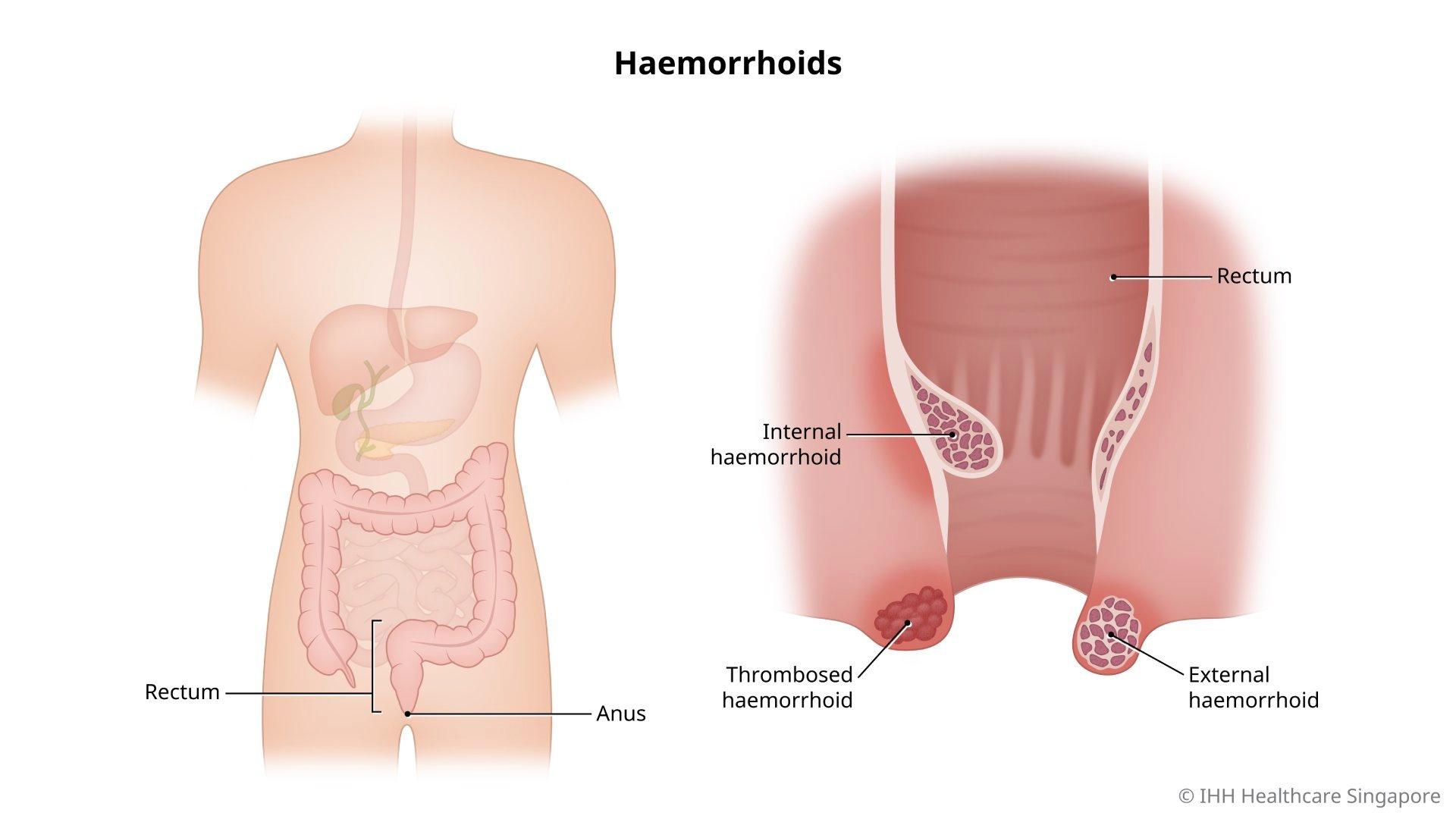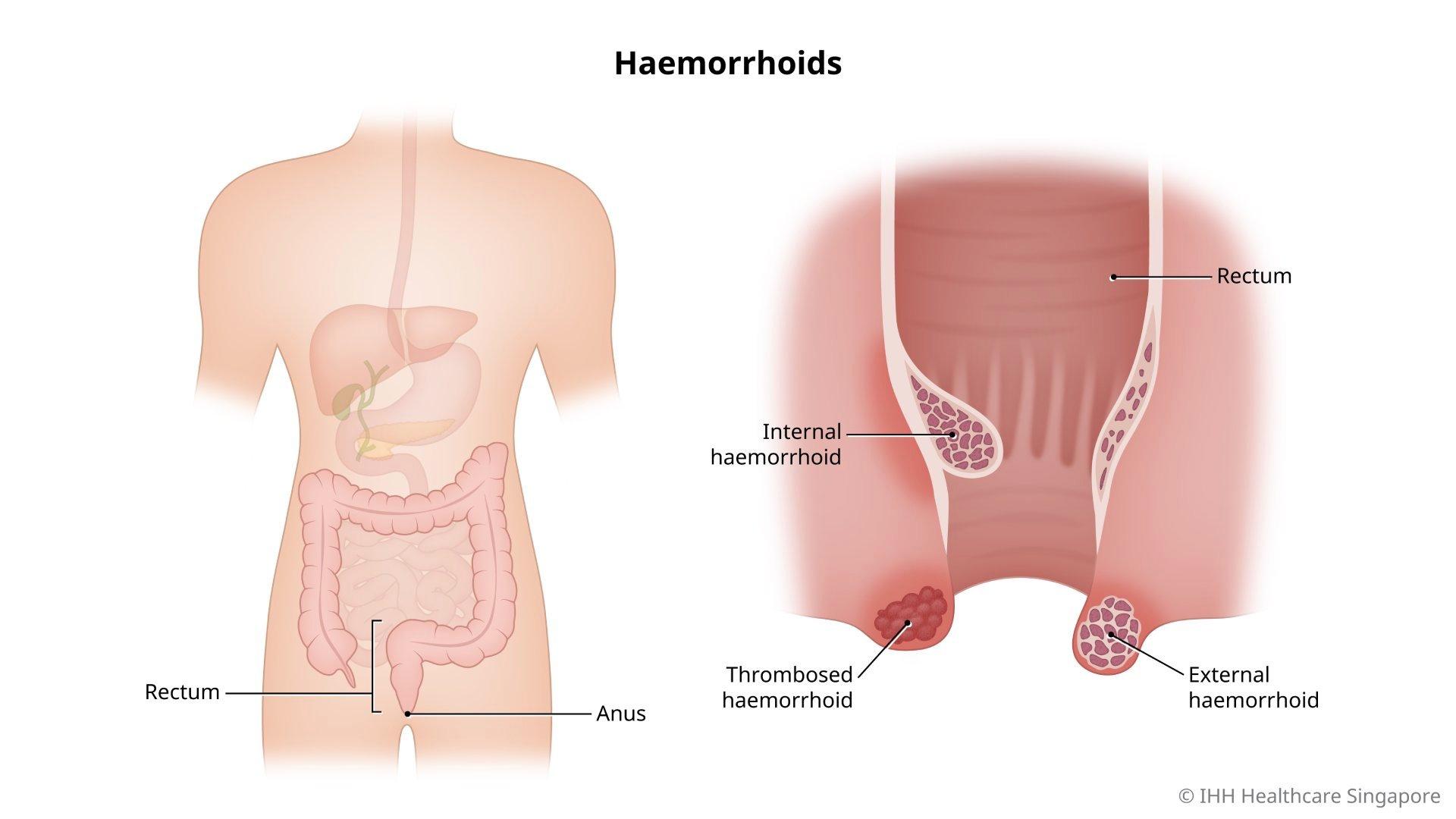Hemorrhoids

What are hemorrhoids?
Hemorrhoids, also known as piles, is a condition in which the veins around the anus or lower rectum become swollen or inflamed.
Types of hemorrhoids
There are 3 types of hemorrhoids:
- Internal hemorrhoids
- External hemorrhoids
- Thrombosed hemorrhoids
What are the symptoms of hemorrhoids?
Symptoms depend on the type of hemorrhoid.
External hemorrhoids – Symptoms include:
- Itchy
- Irritation
- Pain in the anus and surrounding area
- Swelling
- Bleed
Internal hemorrhoids – Internal hemorrhoids are usually invisible and rarely cause discomfort. However, straining or irritation during bowel movements can cause:
- Bleed
- Prolapse or prolapse of hemorrhoids, which can be painful
Thrombosed hemorrhoids – This condition is caused by a blood clot or thrombosis forming in the hemorrhoid. You will notice a hard lump near the anus that is swollen, inflamed and painful.
Other symptoms of hemorrhoids include:
- Blood in stool
- Anal itching
- There is a tumor in the anus.
Note: Hemorrhoid symptoms can resemble those of colorectal cancer. Consult your doctor for a full evaluation and accurate diagnosis.
What causes hemorrhoids?
Hemorrhoids are associated with increased pressure or straining. Causes include:
- Straining during bowel movements
- Chronic constipation or diarrhea
- Obesity
- Lifting heavy objects continuously
- Standing for many hours
- Sitting for long periods of time, especially on the toilet
- Family history of hemorrhoids
- Pregnant
What are the risk factors for hemorrhoids?
In Singapore, 1 in 3 people suffer from hemorrhoids. They are especially common in people over 40 and during pregnancy.
Risk factors that contribute to the development of hemorrhoids include:
- Obesity
- Family history
- Sedentary lifestyle
- Low fiber diet or too high fiber diet
- Poor toilet habits such as straining too much or sitting on the toilet for long periods of time increase pressure on hemorrhoids.
What are the complications and related diseases of hemorrhoids?
Complications from hemorrhoids are uncommon, but may include:
- Anemia. This condition is due to blood loss from chronic hemorrhoids.
- Blood clot. This condition is also known as a thrombosed hemorrhoid. Surgery may be required in some cases.
How to prevent hemorrhoids?
To prevent or reduce the risk of hemorrhoids:
- Don’t hold in your bowel movements . Stools can become dry and hard. This can lead to straining and increase the risk of developing hemorrhoids. It can also cause painless internal hemorrhoids to become painful external hemorrhoids.
- Avoid sitting on the toilet for long periods of time . Sitting on the toilet for long periods of time puts extra pressure on the blood vessels in the anus.
- Eat more fiber . This helps prevent constipation and straining. Also, consider taking a fiber supplement.
- Drink plenty of water . This helps avoid dehydration, which contributes to dry, hard stools and constipation.
- Exercise regularly . This prevents digestive problems by helping food and waste move through the digestive tract. However, avoid sports or activities that involve heavy lifting.
Hemorrhoids can recur after healing. Therefore, adopt healthy lifestyle habits to avoid future hemorrhoid attacks.
How are hemorrhoids diagnosed?
Doctors can diagnose hemorrhoids through:
- Visual anal examination
- Digital rectal exam, in which the doctor checks for abnormal growths in the rectum
- Additional tests use a small camera to detect any abnormalities in the anus, rectum, or colon.
How are hemorrhoids treated?
Treatment for hemorrhoids depends on the type and severity of the condition. Make an appointment with our specialists to get an accurate diagnosis and start treatment early.
Your doctor may recommend the following treatments:
Change your lifestyle
These are simple precautions to help you have regular bowel movements without straining. Examples include increasing your fiber intake and drinking plenty of water.
Home remedies
These are measures that help relieve itching or pain. These measures include using:
- Hydrocortisone
- Hemorrhoid cream, tablets, or suppositories
- Over-the-counter pain relievers
- Take a warm bath or apply a cold compress
Medicines
Your doctor may prescribe oral medications to treat hemorrhoids.
Rubber band ligation of hemorrhoids
A band is placed around the hemorrhoid, which blocks blood flow to part of the hemorrhoid. This treatment must be performed by a doctor.
Injection therapy
The doctor will inject chemicals directly into the blood vessels to reduce their size. This treatment is also called sclerotherapy.
Surgery
Your doctor may recommend surgery to remove the hemorrhoids. This is known as hemorrhoidectomy , this surgery is performed using local anesthesia, spinal anesthesia, or general anesthesia.
-------------------------------------------------------------------------------------------
👉 Contact SunCare for medical support and advice as well as professional private jet transportation services 🇸🇬 SUNCARE PTE. LTD SINGAPORE
🏠 Add: 10 Anson Road, #10-11 International Plaza, Singapore 079903
☎️ Hotline: +65 96727717 (Dr. Lien Minh - Director) Zalo, Viber
📨 Email: suncarehealth@gmail.com






